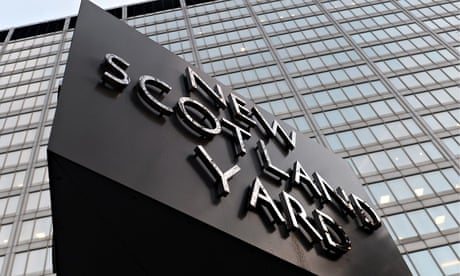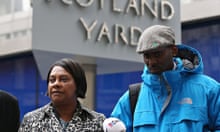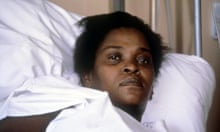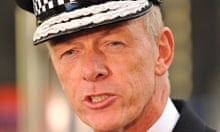Undercover police gathered intelligence on grieving families who were battling the Metropolitan police for justice, including the relatives of Jean Charles de Menezes, Cherry Groce and Ricky Reel.
Police have approached the three families, inviting them to discuss their findings. The meeting with Reel's relatives has already taken place and they were told they had been subject to "inappropriate" surveillance.
Scotland Yard claimed that the families were not the target of the operations but information on them was gathered and wrongly retained as part of the covert infiltration of political groups.
The revelations come as an internal police investigation into the Met's undercover Special Demonstration Squad (SDS) is poised to severely criticise the force for a lack of regard to the rules and law covering the deployment of undercover officers.
The report, to be published on Thursday will say that the information collected by the controversial undercover unit "served no purpose in preventing crime or disorder". Among those who have been contacted by the police are the family of De Menezes, the Brazilian electrician who was shot dead by police in 2005 after being mistaken for a bombing suspect in the aftermath of the 7 July attack on London. Police say that they want to discuss information uncovered in the files of the undercover SDS .
The family of Groce, who was shot and paralysed by police in a bungled raid on her home in 1985, has also been contacted. Her shooting sparked the Brixton riots in 1985. After a long campaign for justice, Sir Bernard Hogan-Howe, the Met's police commissioner, apologised "unreservedly" to the family this month after accepting that the force's failings had put them through "years of suffering". In both cases no more is known about any intelligence-gathering.
Mick Creedon, the Derbyshire chief constable who is running the internal investigation into the undercover unit that operated between 1968 and 2008, will criticise Scotland Yard for disregarding "rules and legislation that clearly set out what they should, and should not have, collected and retained".
In a statement on Wednesday , he said that he will criticise the Met for "the routine gathering and retention of information that was collateral, not linked to an operation or the prevention of crime and it should have been disposed of as part of a weeding process."
Creedon said: "My report is very clear that criticism must be levelled at the MPS [Metropolitan Police] for keeping information, which had been gathered by undercover officers, which served no purpose in preventing crime or disorder."
The criticisms come four months after an independent inquiry concluded that the Scotland Yard undercover unit had spied on the family of Stephen Lawrence, who ran a long campaign to try to persuade police to investigate the death of their son more rigorously. Home secretary Theresa May ordered a public inquiry into undercover policing after discovering the "profoundly shocking and disturbing" revelation about the Met's "spy in the Lawrence family camp".
Creedon's team has told the family of Reel, a 20-year-old student whose body was discovered in a river after he was abused by racists, that undercover officers gathered some information about them "inappropriately".
Reel's family has been pressing the Met for years to carry out a proper investigation into his death, claiming that the police have not taken his death seriously because he was Asian – a charge denied by the police.
Detectives have maintained that his death was likely to have been an accident.
Sukhdev Reel, his mother, said she was "shocked and very upset" when officers told her that the SDS had logged details of her activities in 10 secret reports. She was told that she had been recorded taking part in a vigil, presenting a petition and making a submission to the official inquiry into the police's botched investigation of the racist murder of Lawrence in 1993. She said the police would not explain why some of the surveillance was "inappropriate".
She told the Guardian that at the time the police were spying on her, her family had been "almost on our knees begging" the police to put more resources into investigating Reel's death, but police had refused. "As a family, we have always been victimised by the police, first of all, with Ricky being racially abused and secondly, by the incompetent police investigation. Now it feels as if we have been taken advantage of again, by being reported on when we should not have been, at a time when we were grieving for Ricky."
Reel's family has been campaigning for a proper police investigation since the Brunel University student went missing in 1997 during a night-out with friends.
The group was verbally abused by two white youths who shouted "Pakis go home" and then attacked in Kingston-upon-Thames, London.
The group scattered for safety, but later when they regrouped, Reel had vanished. The family quickly pointed out that there had been a racial attack, but said the police ignored them.
A week later, his body was found in the River Thames. An inquest recorded an open verdict while two police investigations have been unable to establish how he died.
Detectives have worked on the theory that Reel had fallen into the river while urinating, as his flies were undone.
Creedon added: "To date we have found no evidence that any SDS officer targeted or infiltrated any family member of any Justice Campaign, nor the Justice Campaign itself, and we can find no trace of any personal information about family members having been recorded by them.
A spokesperson for the De Menezes Family Campaign said: "It is shameful that the Metropolitan police spied on the legitimate campaign activities of a grieving family who were simply trying to get the answers they deserved after their loved one was killed by police officers."It begs the question - what exactly were the police spying for? We can only assume they were gathering information in an attempt to discredit the family's campaign for justice in order to deflect accountability for their own failings.
"Hearing the news just one day after the anniversary of the shooting exacerbates the family's distress at a time when they are remembering Jean Charles and what he meant to them - a loving, caring, 27 year old, shot down in the prime of his life."







